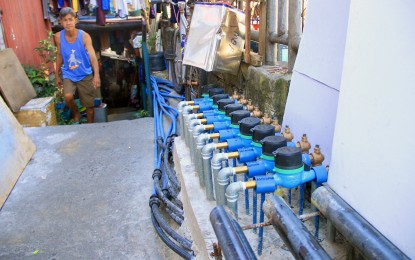
WATCH FOR LEAKS. These water meters provide individual water connections to residents of Barangay Immaculate Conception in Cubao, Quezon City, in this photo taken on Jan. 24, 2024. The DILG on Wednesday (May 15) directed local officials to regularly inspect water meters and report leaks immediately to their concerned service providers. (PNA file photo by Robert Oswald P. Alfiler)
MANILA – The Department of the Interior and Local Government (DILG) on Wednesday directed local chief executives and village officials to regularly monitor water meters in their areas and immediately report leaks to their concerned providers.
In a news release, DILG Secretary Benjamin Abalos Jr. said this is part of efforts to help conserve water following a continued decline in the water level of Angat Dam due to the El Niño phenomenon.
In Memorandum Circular 2024-065 dated May 8, Abalos said local government units (LGUs) must ensure that all government offices have separate water meters to easily monitor water consumption and possible leaks.
Main building water pipe valves must be shut down from 7 p.m. to 6 a.m., and building administrators must regularly check for leaks and faulty fixtures especially in toilets.
Abalos urged LGUs to carry out extensive information, education and communication campaigns on water conservation measures to raise awareness and promote active participation among residents.
He also encouraged LGUs to promote and maximize rainwater harvesting in government facilities or water catchment systems in residential areas to collect and store water for cleaning and other non-potable uses.
“Lahat ay dapat kumilos at magtulungan para maiwasan ang water interruptions. Maging masinop at matipid po tayo sa paggamit ng tubig (All of us must act and work together to prevent water interruptions. Let us be prudent in saving water),” he said.
He also urged the public to store and reuse rinse and laundry water to clean floors, flush toilets, water plants, and other activities; use dippers (tabo) and buckets instead of hoses and refrain from using inflatable pools.
Don’t deal with fixers
Abalos, meanwhile, called on local officials to exercise utmost diligence and scrutiny in their engagements and transactions.
This came after the agency received reports of persons and groups posing as agents of the DILG and the Department of Budget and Management (DBM), claiming they can facilitate the approval and release of funds for locally funded projects.
“These incidents of poseurs claiming to be government agents pose serious threats to the integrity of government processes and undermine the trust and confidence of the public in the administration of government funds,” Abalos said.
He said the DILG strictly adheres to procedures and guidelines as to the release of funds, and any transactions and engagements that do not conform with such rules “will not be tolerated nor condoned and will be dealt with accordingly.”
He reminded LGUs to be vigilant in handling email correspondence related to government transactions, particularly in the Digital Request Submission for Local Government Support Funds (DRSL) in the DBM apps portal.
“Sharing such details poses a significant risk to the security and integrity of the system and may lead to unauthorized access and potential misuse of sensitive information,” he said.
He instead urged LGUs to report any instances of suspicious or unauthorized activities to law enforcement agencies. (PNA)
